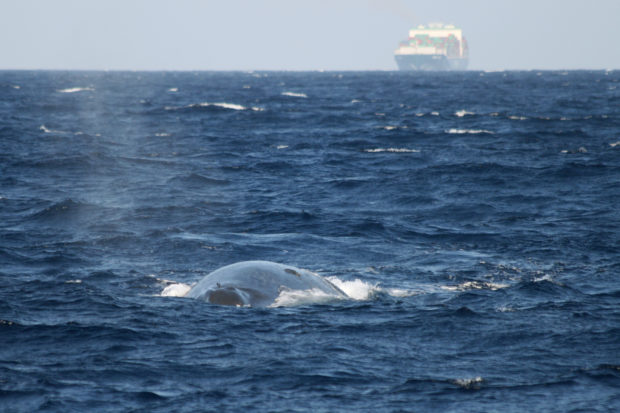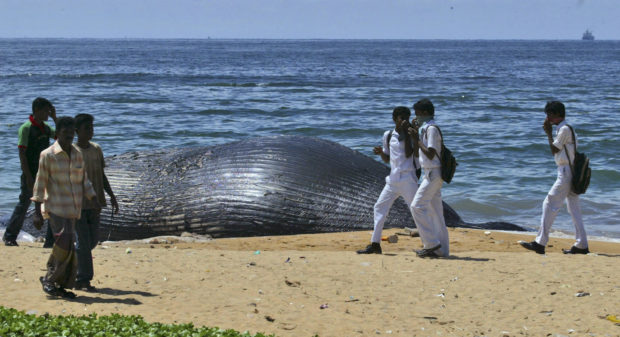Unusual alliance in Sri Lanka forged to save blue whales

This March 4, 2014, photo provided by the International Fund for Animal Welfare, a blue whale swims in Sri Lanka as a container ship appears in the background. In Sri Lanka, an unusual alliance has been forged: conservationists and shipping companies have aligned in a bid to move one of the world’s busiest shipping lanes, to save the blue whales often spotted feeding there. (Tim Lewis/International Fund for Animal Welfare via AP)
SRI LANKA – When the feeding grounds of blue whales overlap with busy shipping lanes, business interests often supersede those of the endangered marine mammals.
But in Sri Lanka, an unusual alliance has been forged: conservationists and shipping companies have aligned in a bid to move the heavily-trafficked lane about 28 kilometers (17 miles) away to help avoid collisions between whales and freighters.
The only holdout is Sri Lanka, which has so far declined to sign off on the proposal, jeopardizing the future there of the biggest animal ever known to have lived on the planet, scientists say.
The hundreds of blue whales in Sri Lankan waters — marine biologists estimate there are 600 to 1,500 — feed on tiny shrimp in the shipping lane, and are also believed to mate and give birth nearby.
Shipping executives say they would gladly relocate the traffic corridor, recognizing their ships would be safer in waters not already clogged with fishing vessels, whale-watching boats and the whales themselves, which can grow to more than 33 meters (100 feet), more than twice the length of a Tyrannosaurus Rex dinosaur.
Article continues after this advertisementBryan Wood-Thomas, vice president of the World Shipping Council, said the group wrote to the Sri Lankan prime minister in 2017, affirming that all major international shipping organizations believed Sri Lanka should work with the United Nations to move its traffic lane.
Article continues after this advertisement“This is one of the few cases in the world where we can physically separate ships from where the whales are,” Wood-Thomas said. “Yes, it adds a little distance, fuel and money to shipping costs, but the extra cost is really minor.”
He said it was no small feat to get the majority of the world’s shipping companies to agree to move the shipping lane in Sri Lanka.
“There are other places in the world where doing this would incur significant fuel costs or add a lot of time to the journey that businesses will not be happy to absorb,” he said.
For a shipping lane to be moved, the country whose waters are most affected must submit a formal proposal to the International Maritime Organization, the U.N. agency that regulates shipping.
Despite numerous meetings between scientists, the shipping industry and U.N. officials during the past six years, Sri Lankan officials have demurred from supporting the shipping lane shift.
Rear Adm. Rohana Perera of Sri Lanka’s Marine Environment Protection Authority said the government is concerned about the economic impact of the proposed shipping lane move on its ports, fearing passing ships might not be as inclined to stop in Sri Lanka. He said a decision would “hopefully” be made in March.

FILE – In this Nov. 6, 2007, file photo, people walk past the dead body of a whale in Colombo, Sri Lanka. In Sri Lanka, an unusual alliance has been forged: conservationists and shipping companies have aligned in a bid to move one of the world’s busiest shipping lanes, to save the blue whales often spotted feeding there. (AP Photo/Eranga Jayawardena, File)
The recent political turmoil in Sri Lanka has also complicated matters; a new government was only formed in late December after the president sacked the prime minister, prompting a constitutional crisis.
Perera acknowledged Sri Lanka had other priorities at the moment, but said they also recognized the importance of protecting blue whales.
“Conservation problems are usually so complex, but this one is very clear-cut,” said Asha de Vos, executive director of Oceanswell, a Sri Lankan marine nonprofit.
In many parts of the world, there is no easy solution to the convergence of ships and cetaceans.
For example, scientists have long been worried about the sperm whales that live in the Straits of Gibraltar, but have few solutions.
“It’s an incredibly busy area for shipping, but unfortunately, there’s not much scope for moving the shipping lane because the straits are so narrow,” said Russell Leaper, the scientific lead for blue whales at the International Fund for Animal Welfare, a conservation group. / gsg